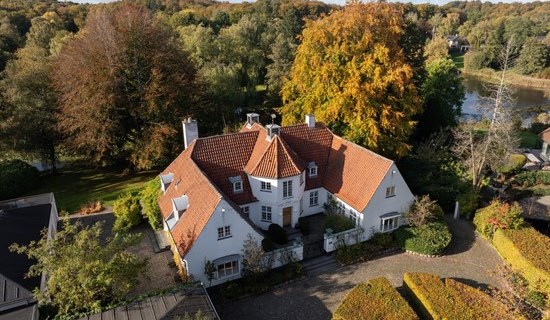BEMÆRK: Ansøgningsfristen er overskredet
We invite applications for a Postdoctoral Researcher in Eco-Evolutionary Paleogenomics. The position is funded for up to 2 years with a start date of 1 January 2024 or as soon as possible thereafter. The position will be based at the Globe Institute, University of Copenhagen. Information on the department can be found at: www.globe.ku.dk
Our research
The successful candidate will join the Conservation Palaeogenetics & Palaeoecology Group at the Center for GeoGenetics led by Assistant Professor Ana Prohaska. We work at the interface of ancient genetics, palaeoecology, evolutionary biology, and conservation science to understand how species and ecosystems responded to past environmental change and how this understanding can inform conservation decision-making today. Our focus is on identifying and recovering genetic diversity relevant to preserving Earth’s contemporary biodiversity into the future. For more information about the group and our research, please see: globe.ku.dk/research/geogenetics/prohaska-group/
You will also be part of the newly established Centre for Ancient Environmental Genomics. This is an interdisciplinary research center committed to unlocking the vast, yet largely untapped research potential of ancient environmental genomics by enhancing key experimental and computational capabilities. The goal is to study community-wide and population-level processes on an unprecedented temporal and spatial scale to help resolve fundamental questions about the history of life on Earth. The centre brings together a diverse team of researchers with backgrounds in geology, genetics, ecology, evolutionary biology, computer science, statistics, and more.
Your Position
The successful candidate will be part of the team leading the Great Adriatic Plain Project. During the Quaternary glacial periods, the Great Adriatic Plain represented the southernmost coastal plain of Europe. It is widely postulated to have served as a crucial glacial refuge, preserving European biodiversity in the face of unfavourable climatic conditions. The project aims to test this hypothesis by reconstructing the ecological communities inhabiting the Great Adriatic Plain during the Last Glacial period and investigating their eco-evolutionary responses at the onset of the Holocene period. The study will pioneer the analysis of ancient environmental DNA from submerged Pleistocene sediments in the Adriatic basin, in tandem with ongoing sedimentological, palynomorphological and stable isotope analysis efforts headed by Dr Slobodan Miko and his group at the Croatian Geological Survey.
The selected candidate will spearhead the computational analysis of the large-scale ancient metagenomic datasets generated as part of the project, and the subsequent population- and ecosystem- level modelling. While a significant amount of material has already been collected, the role also offers opportunities for further field collections from additional lake sites along the Croatian coast.
In addition to the main project tasks, the role provides avenues for the successful applicant to contribute to other ongoing projects within the centre.
Advisors will be Assistant Professor Ana Prohaska and Professor Rasmus Nielsen.
Your Profile
We are looking for a highly motivated and enthusiastic candidate with the following competencies and experience.
Essential experience and skills
- PhD in computational biology, genetics, evolutionary biology, ecology, or related fields.
- Documented experience in Next-Generation-Sequencing (NGS) data analyses.
- Keen interest in using ancient (environmental) DNA to track ecological and evolutionary changes through time.
- Proficiency in programming languages, e.g. C/C++, Python, and R.
- Proficiency in written and oral communication skills.
- Ambition and drive, strong work ethics, and good interpersonal skills.
- Track record of publishing in peer-reviewed journals.
- Ability to organise time and work effectively and responsibly, independently and in teams.
- Fluency in both written and spoken English (due to the institute's international profile).
Desirable experience and skills
- Knowledge of ancient (environmental) DNA laboratory techniques.
- Experience in the analysis of ancient genomic data, paleoecological time series data, and/ or ecological modelling techniques.
- Enthusiasm to be part of an interdisciplinary research project and work collaboratively with scientists across a wide range of disciplines.
Place of employment
The place of work is at the Center for GeoGenetics, Globe Institute, University of Copenhagen. We offer supportive, creative, and stimulating working conditions within a dynamic and international research environment. Our research facilities include a LEAF GOLD certified molecular lab, designed for generating genomic-scale datasets from both modern and ancient specimens, complemented by high-capacity computational servers adept at handling such data.
The Globe Institute is committed to creating an inclusive and diverse environment where employees and students can belong and thrive (https://globe.ku.dk/about/diversity-programme/). All qualified applicants will receive full consideration. Candidates who, through their research, teaching, and/or service, contribute to diversity and competencies of our Institute are encouraged to apply.
The University of Copenhagen strives to offer a family friendly and flexible working environment with a sustainable balance between work- and private life, including parental leave schemes (up to 47 weeks for both parents) and up to six weeks of paid holidays per year. Researchers that have not been tax liable in Denmark for the last 10 years can apply for a special (reduced) tax scheme. The university offers a variety of services for international researchers and accompanying families.
Terms of employment
The average weekly working hours are 37 hours per week.
The position is a fixed-term position limited to a period of 2 years. The starting date is on 1 November 2023 or based on an agreement.
Salary, pension and other conditions of employment are set in accordance with the Agreement between the Ministry of Taxation and AC (Danish Confederation of Professional Associations) or other relevant organisation. Currently, the monthly salary starts at 36,291 DKK/approx. 4,850 EUR (April 2023 level). Depending on qualifications, a supplement may be negotiated. The employer will pay an additional 17.1 % to your pension fund.
Foreign and Danish applicants may be eligible for tax reductions, if they hold a PhD degree and have not lived in Denmark the last 10 years.
The position is covered by the Job Structure for Academic Staff at Universities 2020.
Questions
For further information please contact Assistant Professor Ana Prohaska at ana.prohaska@sund.ku.dk.
Foreign applicants may find this link useful: www.ism.ku.dk (International Staff Mobility).
Application procedure
Your online application must be submitted in English by clicking ‘Apply now’ below.
Furthermore, your application must include the following documents/attachments – all in PDF format:
1. Motivated letter of application (max. one page).
2. CV incl. education, work/research experience, language skills and other skills relevant for the position.
3. A certified/signed copy of a) PhD certificate and b) Master of Science certificate. If the PhD is not completed, a written statement from the supervisor will do.
4. List of publications.
Deadline for applications: 1 October 2023, 23.59pm CET.
We reserve the right not to consider material received after the deadline, and not to consider applications that do not live up to the abovementioned requirements.
The further process
After the expiry of the deadline for applications, the authorized recruitment manager selects applicants for assessment on the advice of the hiring committee. All
applicants are then immediately notified whether their application has been passed for assessment by an unbiased assessor. Once the assessment work has been completed each applicant has the opportunity to comment on the part of the assessment that relates to the applicant him/herself.
You can read about the recruitment process at https://employment.ku.dk/faculty/recruitment-process/
The applicant will be assessed according to the Ministerial Order no. 242 of 13 March 2012 on the Appointment of Academic Staff at Universities.
Interviews are expected to be held in weeks 45-46
INFORMATIONER OM STILLINGEN:
- Arbejdspladsen ligger i:
Gladsaxe Kommune
-Virksomheden tilbyder:
-Arbejdsgiver:
KU - SUND - PANUM KBH N, Blegdamsvej 3B, 2200 København N
-Ansøgning:
Ansøgningsfrist: 15-09-2023; - ansøgningsfristen er overskredet
Ved skriftlig henvendelse: https://candidate.hr-manager.net/ApplicationInit.aspx?cid=1307&ProjectId=159603&DepartmentId=19217&MediaId=4632&SkipAdvertisement=true
Se mere her: https://job.jobnet.dk/find-job/5883507





